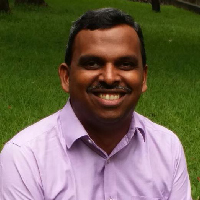Course ID: MA2101
Course Credits: 4
Course Type: Diploma
Pre-requisites: MA1101 - Math for Electronics I
Course ID: MA2101
Course Credits: 4
Course Type: Diploma
Pre-requisites: MA1101 - Math for Electronics I
What you’ll learn
Course structure & Assessments
4 credit course, weekly online assignments, 2 in-person invigilated quizzes, 1 in-person invigilated end term exam. For details of standard course structure and assessments, visit Academics page.
| WEEK 1 | Introduction, Real and complex numbers, Vectors, linear equations and linear combination in R^2, Span of a set of vectors in R^2, Vector spaces and Subspaces, Linear dependent and Independent vectors, Basis and dimension of vector (sub)space in R^2, Change of basis in R^2. |
| WEEK 2 | Linear Transformations in R^2, Linear Transformation and Basis, Matrix representation of a Linear Transformation,Range, Null, and Rank of a Linear Transformation, Composition of Linear Transformation and Matrix Multiplication,Inverse of a linear transformation, Change of basis. |
| WEEK 3 | Range and Null space of Composition of Linear transformation in R^2, Linear Operators, Applications of operators, Scaling and rotation, Basic matrix algebra and complex vector space, Eigenvalues, Eigenvectors, Properties of eigenvalues and eigenvectors, Diagonalization of a Matrix, Power of a Matrix. |
| WEEK 4 | Inner product in R^2 and C^2, Magnitude of a vector, Distance between two vectors, and Angle between vectors, Orthogonal complement or Dual, Inner product as a Linear transformation, Adjoint of an operator, Range and Null of an Operator and its Adjoint, Operations with adjoint, Eigenvalues and Eigenvectors of an operator and its adjoint, Least square fit: Orthogonality principle. |
| WEEK 5 | Vector spaces in R^n and C^n, Span of vectors, Linear dependence and independence, spanning sets and basis, Linear Transformations (in Higher dimensions), Range and Null of a Linear Transformation, Fundamental theorem of Linear Transformation |
| WEEK 6 | Matrix Algebra - Addition, Multiplication, Inverse, and Powers, Eigenvalues and eigenvectors, Existence of eigenvalues, Determinants, Algebraic and Geometric multiplicities, Diagonalizability and its applications, Change of Basis, Upper Triangularization, Circular Convolution and Circular Matrix. |
| WEEK 7 | Inner Product Spaces, Norm of vector, Orthogonal vectors, Orthogonal decomposition, Orthonormal basis and orthonormalization, Gram-schmidt orthonormalization, Orthonormal basis: Properties, Least Square Solutions,Orthogonal Complement and Projections. |
| WEEK 8 | Operators in Inner product spaces, Adjoint of a linear transformation, Four fundamental spaces, Operators and their adjoints, Eigenvalues and Eigenvectors of operators, Self adjoint operators, Diagonalizability of self adjoint operators |
| WEEK 9 | Conics in 2D, Quadratic forms and Symmetric matrices, Oscillation modes in system, Correlation and Covariance Matrix, Positive semi-definite matrices, Graph and Adjacency Matrix |
| WEEK 10 | Circulant Matrices and Fourier Basis, Discrete Fourier Transform (DFT), Normal Operators and Matrices. |
| WEEK 11 | Sequence and Function spaces, Inner product and Norm in Sequence and Function spaces, Orthonormal basis for Signal spaces, Polynomial Approximations and Projections in Function Spaces, Sinusoids, Projection, Fourier Series, Complex Exponential form of Fourier Series |
| WEEK 12 | Course Summary |
Prescribed Books
The following are the suggested books for the course:
“Thomas’ Calculus (14th edition),” J. R. Hass, C. E. Heil and M. D. Weir, Pearson.
“Calculus (8th edition),” J. Stewart, CENGAGE Learning.
“Calculus, Vol 1 and Vol 2, 2ed (An Indian Adaptation),” T. M. Apostol, J. Singh and S. Goyal, Wiley.
“Advanced Engineering Mathematics,” E. Kreyszig, Wiley.
“Linear Algebra and its Applications,” G. Strang, CENGAGE Learning
About the Instructors

Andrew Thangaraj received his B. Tech in Electrical Engineering from the Indian Institute of Technology (IIT) Madras in 1998 and Ph.D. in Electrical Engineering from the Georgia Institute of Technology, Atlanta, USA in 2003.
He was a post-doctoral researcher at the GTL-CNRS Telecom lab at Georgia Tech Lorraine, Metz, France from Aug 2003 till May 2004. Since 2004, he has been a faculty at the Department of Electrical Engineering, IIT Madras, where he is currently a professor.
His research interests are in the broad areas of information theory, error-control coding and information-theoretic aspects of cryptography. From Jan 2012 till Jan 2018, he served as Editor for the IEEE Transactions on Communications. From July 2018, he is an Associate Editor for the IEEE Transactions on Information Theory.
From Nov 2011, he has been one of the NPTEL coordinators for IIT Madras. At NPTEL, he has played a key role in the starting of online courses and certification. He is currently a National MOOCs coordinator for NPTEL under the SWAYAM project of the MHRD.
Prof. Andrew is also one of the coordinators for the IIT Madras Online BSc Degree Program, which was launched in June, 2020.
Other courses by the same instructor: MA1101 - Math for Electronics I